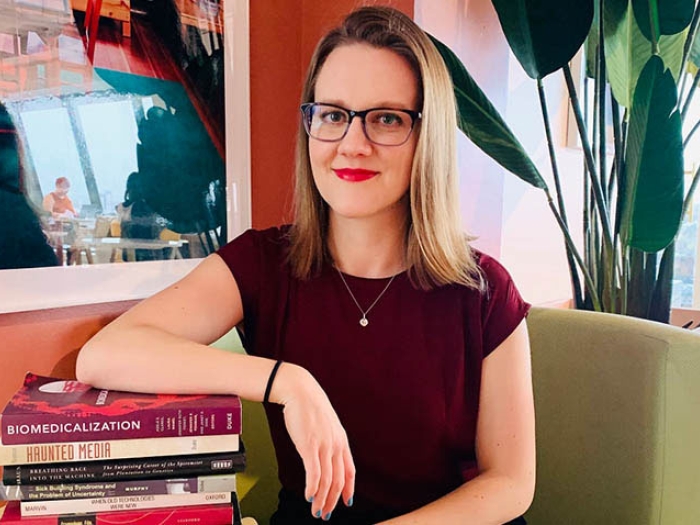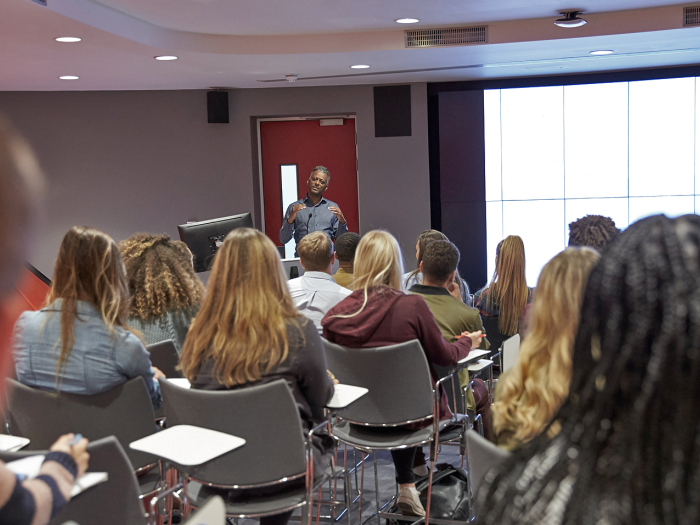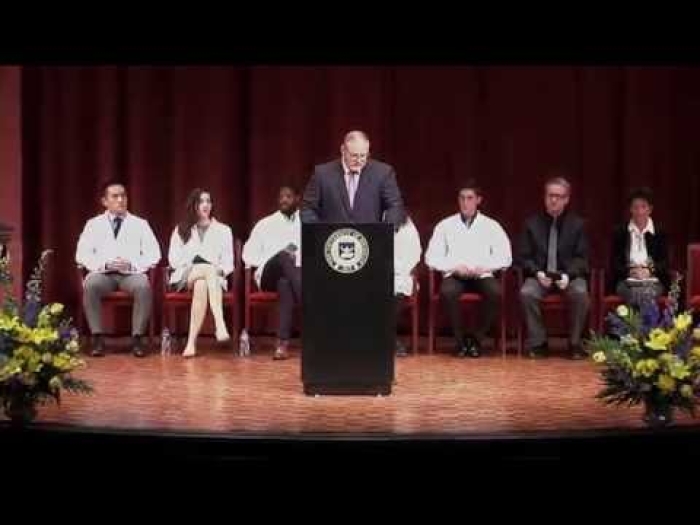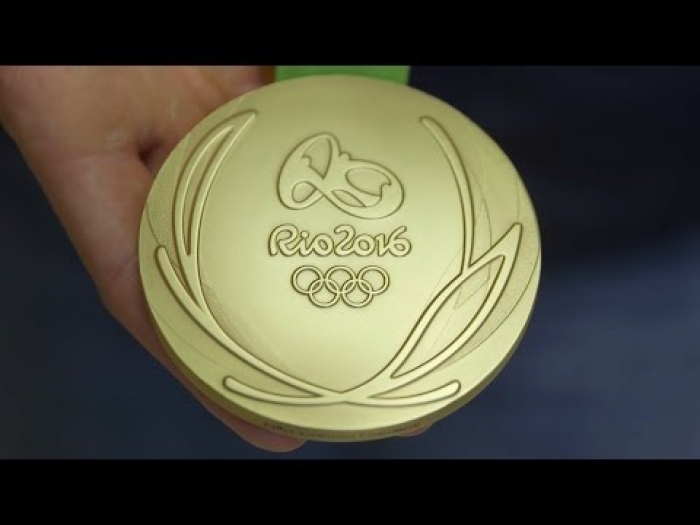For the first people in their families to attend or complete college, the notion of med school might seem daunting. Three U-M students share tips for success.
7:00 AM
Author |
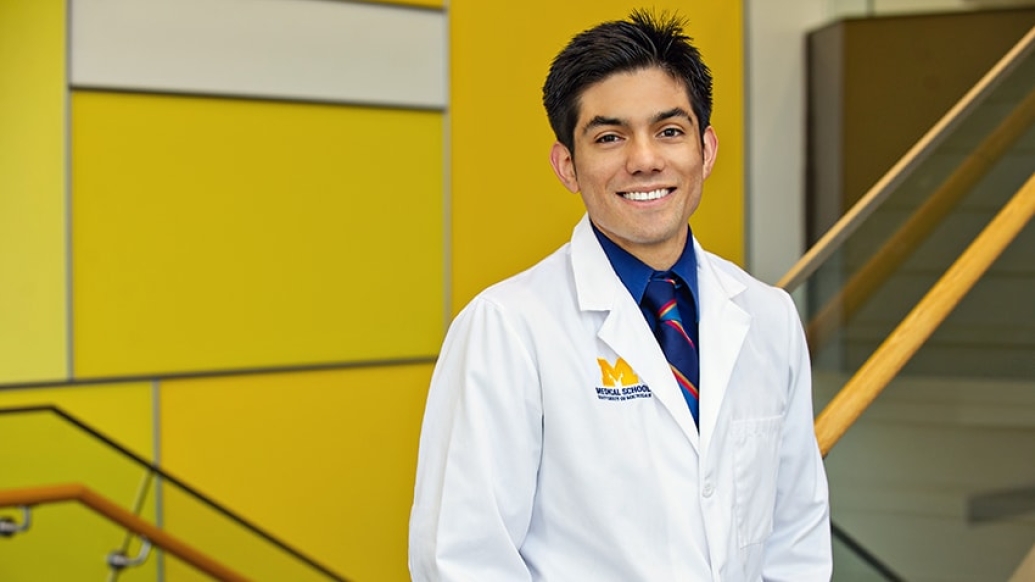
Juan Caceres learned the value of hard work from a young age. After emigrating with his parents from their native Colombia at age 6, the family elders held multiple service-industry jobs to make ends meet.
His mother and father both had completed some college, but the foreign credits were invalid in Tampa, Florida, where the couple settled. Still, they nurtured their child's education and encouraged him to dream big.
LISTEN UP: Add the new Michigan Medicine News Break to your Alexa-enabled device, or subscribe to our daily audio updates on iTunes, Google Play and Stitcher.
But the Caceres family knew little about the application process — insight and intuition that teenagers of some American families might take for granted.
"Nobody had any idea how to figure out all the obstacles," says Caceres, now 23 and a rising M2 at the University of Michigan Medical School. "There were difficulties along the way. I didn't learn about the SAT until my junior year of high school."
And that was just for undergraduate education, not the far bigger challenge of medical school.
Nicole Honey faced a knowledge gap when preparing for that next step after college graduation. She recalls telling her mother, a business owner who grew up on a Native American reservation in the Upper Peninsula of Michigan, of her apprehensiveness about spending the next decade in training to become a doctor.
Her mom's reply: Oh, isn't med school only a few years?
Nor did the student grow up with professional exposure to the field. "I didn't know any physicians other than my pediatrician," says Honey, 25, also a soon-to-be M2 at U-M.
From a town of 900 in rural Montana, Bridger Rodoni had a similar experience. His family, though wholly supportive, couldn't advise him.
It didn't stop Rodoni and other first-generation peers at U-M from sharing a similar sentiment: With hard work and the help of others, you can succeed.
"Medical school definitely wasn't a situation where the finances or my background or anything else was going to keep me out," says the 23-year-old Rodoni, who will be starting his M2 year in September. "The only question was how far I wanted to push the envelope."
Caceres, Honey and Rodoni spoke recently about their experiences.
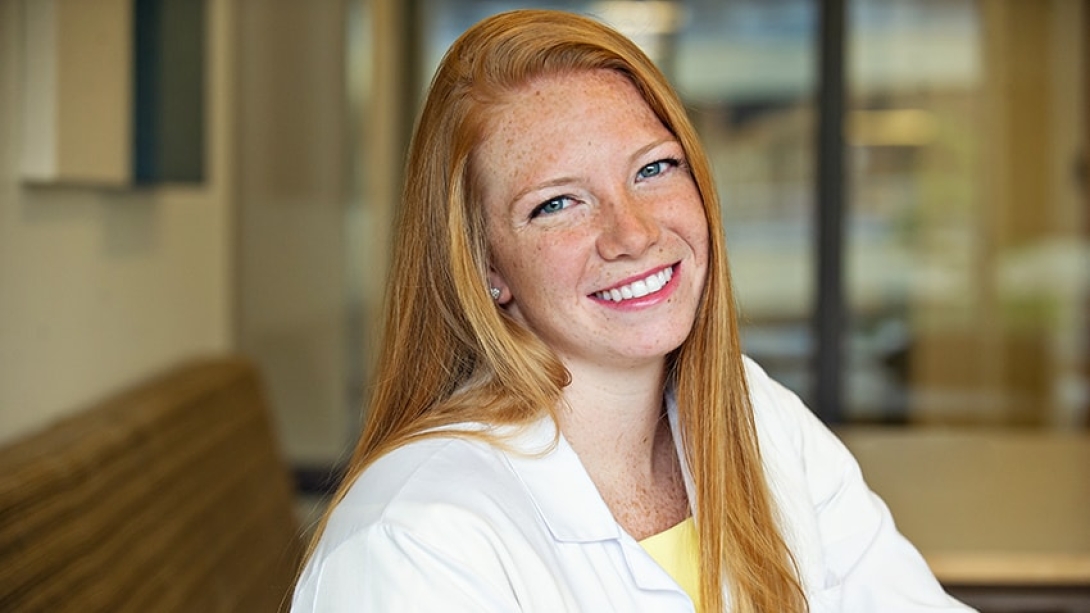
Medical school advice from first-generation students
Think ahead, if possible: Having an early interest in medicine — even if a career goal isn't immediately clear — has value. Caceres, for instance, remembers interpreting for his parents in Spanish when they would visit the doctor. "I saw a lot of disparities in my community," he says.
That memory resurfaced when Caceres went to study biology at Emory University, where he volunteered with an interpreting club that aided Spanish-speaking patients. He has since founded a similar club at Michigan.
MORE FROM THE LAB: Subscribe to our weekly newsletter
For Honey, a former U-M undergraduate student-athlete, a conversation about careers with her diving coach helped solidify her interest in working with patients.
"He said, 'You don't want to be in a lab; you like people too much,'" recalls Honey, who earned a kinesiology degree.
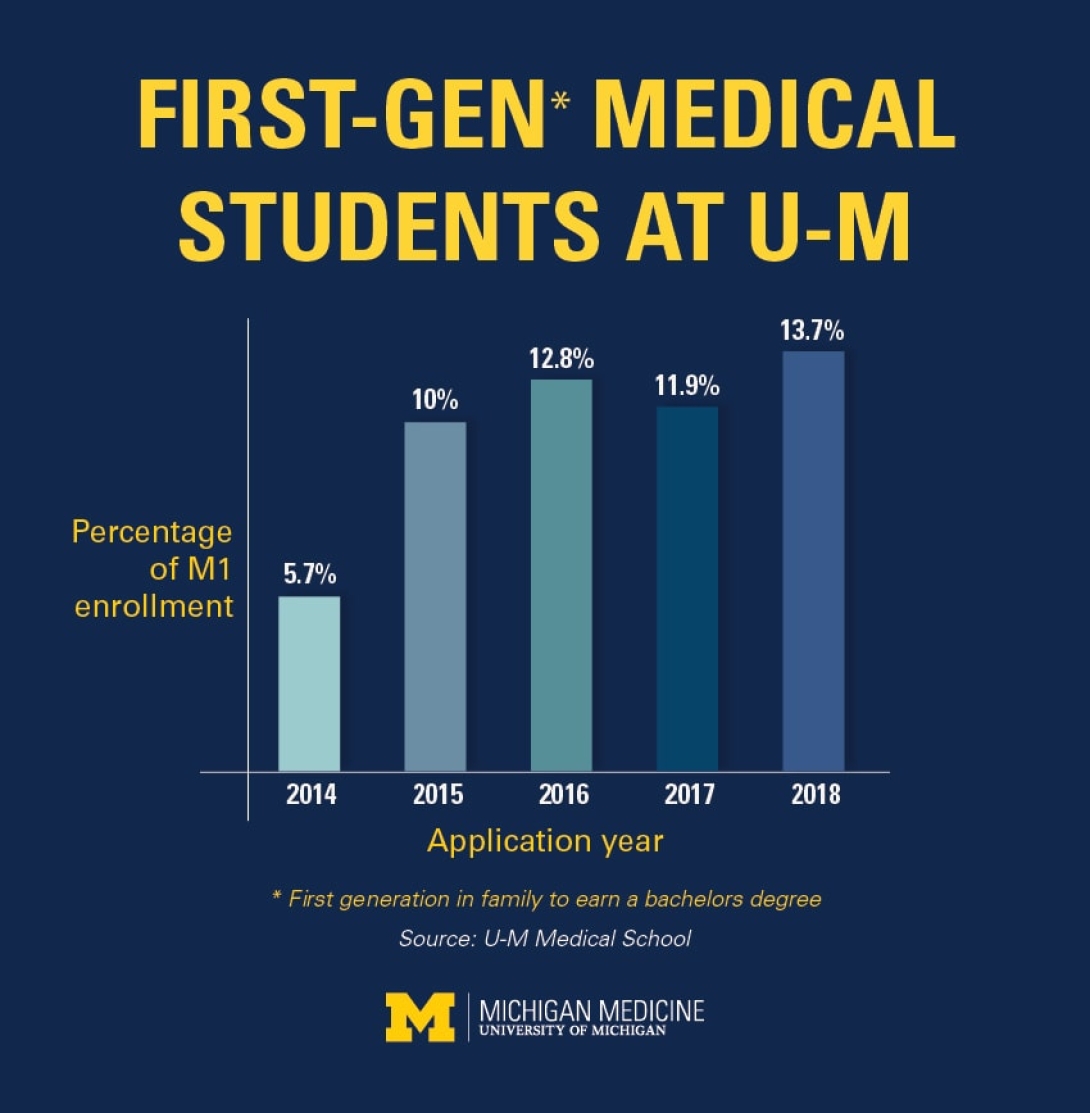
Still, knowing your path isn't mandatory.
Rodoni, a football player at Northern Arizona University, planned to become an athletic trainer. But a knee injury during his freshman season — and the resulting experience with surgeons — compelled Rodoni to change his major to biological sciences and fostered new ambitions of becoming a doctor.
"Before, it wasn't even a thought in my head," he says.
Seek mentors of all stripes: Applying to medical school takes a village. As Caceres moved through his undergrad education, he amassed a network of professors, advisers and upperclassmen who shared knowledge and encouragement about the process.
One mentor told him to camp outside a faculty member's office to get a letter of recommendation for a competitive summer program for pre-med students. Caceres also networked online, fostering ties with other med students and doctors — both before and after coming to Michigan.
Rodoni looked to several doctors for guidance, as well as a faculty member who challenged him to excel on a research project on exercise and aging.
"Somebody who pushes you beyond what undergrad says is OK is instrumental — because the bar in medical school is so far above and beyond what undergraduate education prepares you for," Rodoni says. "I can never thank Dr. Traustadottir enough for that."
Honey, who found valuable insight via a U-M program that partners the college's athletes with on-campus medical mentors, maintains that students still must make the first move: "You really have to reach out, try to find resources and pick as many brains as you can."
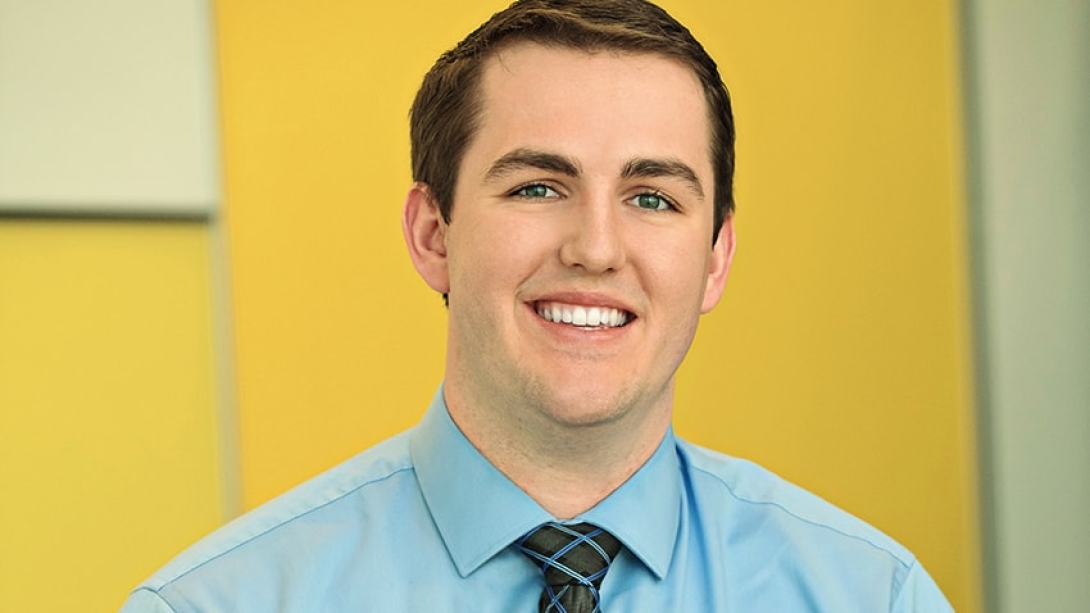
Learn from your classmates: Although the environment at U-M's medical school is highly collaborative, first-generation students have a unique resource in each other.
"Power forms in unity," says Caceres, a member of several Hispanic student groups at Emory. "Look for people in your same situation. You can push each other up."
SEE ALSO: What the Michigan Med School Admissions Team Looks for on Applications
But casting a wider net also has value.
Says Honey: "Meeting people who aren't first-generation students or have older siblings who are doctors — or people who have already applied and understand how it works — is important."
Some of those individuals, she adds, helped proofread her essays and ensure she submitted her application early as an undergrad, key details that medical school admissions officers look for.
Dropping an "everyone for themselves" mentality is crucial in med school, Rodoni says. Study methods that may have worked as an undergraduate also likely need a refresh, he notes: "What worked for you in the past might not work anymore."
That could include more (or fewer) group study sessions, flashcards or reviewing material at different hours.
A big part of this is knowing that you can't do it all by yourself.Juan Caceres, incoming M2
Pursue research and extracurriculars: Sure, undergraduate students need to spend plenty of time hitting the books. But activities and independent lab work tied to health and other pursuits can help foster direction and boost a student's profile when applying to medical school.
That was key for Honey, who worried at first that her sporting commitments would overshadow her resume. "People encouraged me to keep pursuing it because medical schools are looking for applicants with passion, like athletes."
SEE ALSO: To Achieve Diversity Among Doctors, Start in Pre-Med Years
Still, her research work with a Michigan OB-GYN, to whom she connected via U-M's student-athlete mentorship program, was critical.
Strong research mentors didn't just help Rodoni become a better scientist and student; they shared intuition he couldn't find elsewhere. After all, "You can't just go ask your mom or dad, 'Hey, how did you become a doctor?'" he says.
"Not having mentorship and guidance is one of the biggest missed opportunities for someone of a first-generation background."
Caceres also credits his laboratory and extracurricular activities for helping him excel. Many medical schools asked him about his background as a medical interpreter during the interview process.
Now that he's advising a similar group at Michigan, the doctor-to-be takes pride in planting the seeds for others to succeed — as well as assisting a disadvantaged patient population that, in part, guided him to this career path.
That, Caceres says, embodies the importance of first-generation med students looking out for their own: "A big part of this is knowing that you can't do it all by yourself."
Photos by Leisa Thompson

Explore a variety of healthcare news & stories by visiting the Health Lab home page for more articles.

Department of Communication at Michigan Medicine
Want top health & research news weekly? Sign up for Health Lab’s newsletters today!

